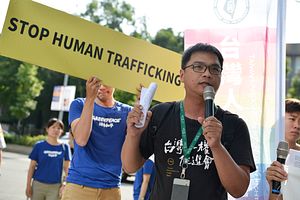A deadly fire ripped through a warehouse in Taoyuan, about one hour west of Taipei, on February 6, claiming the lives of three Vietnamese nationals and raising uncomfortable questions about Taiwan’s ability to ensure the safety of its roughly 700,000 Southeast Asian migrant workers.
The blaze was Taiwan’s third fatal factory fire since December 2017, when a fire at a Taoyuan plastics factory killed six Vietnamese workers. In April 2018, another fire at a circuit board factory in Taoyuan took the lives of five firefighters and two Thai workers.
The latest fire, which struck the second floor of a Kerry Logistics Company warehouse that had been opened just two months earlier, further marred an industrial fire safety record that had recently been criticized by Taiwan’s Control Yuan, the country’s governmental watchdog agency.
Illegal Hiring Remains Rampant
Taiwan’s population of Southeast Asian migrant workers, who make up around 3 percent of people in the country, are subject to labor laws that regulate their minimum wage, working hours, and basic rights as contracted workers. However, the employers and third-party brokerage agencies who facilitate their employment in Taiwan are often accused of contravening these laws.
Kerry Logistics was not licensed to hire foreign employees when it hired six Vietnamese workers, including the three who died in the February 6 fire, according to Vietnam’s Department of Overseas Labor. Vietnam’s Worker Management Board is now demanding an investigation and asking for financial reparations for the victims’ families, some of whom have traveled to Taiwan since the fire.
A report from Apple Daily initially suggested the six workers were hired by a contractor performing maintenance on air conditioning and temperature control units in the factory, while a report from Vietnam Plus says the workers had been hired by the firm on a part-time basis over the Lunar New Year holiday.
Taiwanese companies are often cited for employing illegal or improperly registered foreign workers, and migrant worker advocacy groups say workers from Southeast Asia are not always made aware of their rights.
Migrant workers in Taiwan are in most cases managed by third-party brokerage agencies, who have long been criticized for guiding workers into confusing employment arrangements that include high administrative and placement fees – a practice that the U.S. Department of State, in its yearly Human Rights Report, has said leaves workers “vulnerable to debt bondage.” Many workers flee employment contracts and seek illegal work to escape mounting debt, often without knowing the consequences.
Taiwan’s Ministry of Labor is responsible for regulating the country’s brokerage agencies, but its yearly evaluations have been criticized as shallow and insufficient and have failed to uncover labor violations discovered later by independent observers, journalists, and migrant workers themselves.
A Dismal Industrial Fire Safety Record
Taiwan’s latest factory fire occurred on a warehouse floor where, according to initial and unconfirmed information, flammable alcohol stored in the building may have ignited the blaze.
The major fires that preceded the February 6 accident, however, spread to on-site dormitories for factory workers. In May, shortly after the April 2018 fire at a Chin Poon Industrial Company circuit board plant, migrant worker advocates and firefighters joined to call for a ban of on-site housing at factories, citing safety concerns for residents and first responders. The groups also demanded improvements in workplace safety standards and labor inspections at Taiwan’s factories.
Ministry of Labor officials initially called an inter-ministerial meeting in June to discuss regulations that would stipulate a safe distance between factories and dormitories. However, the ministry said in October it would not implement a ban on on-site dorms, instead announcing a plan to penalize employers who do not follow safety standards. Under the proposal, the ministry will reduce an employer’s foreign worker hiring quota by five every time a migrant worker dies due to negligence and by one when a migrant worker is injured.
A committee of Taiwan’s Control Yuan criticized governmental inaction in December, saying the Ministry of Labor, the National Fire Agency, and the Construction and Planning Agency should be censured for failing to monitor unsafe conditions within worker dormitories. Committee members Wang Yu-ling and Wang Mei-yu said that none of 13 dormitories inspected met Taiwan’s dormitory safety regulations.
The committee members also noted the lack of government inspectors tasked with regularly monitoring the dormitories. As of June, their report said, there were just 336 consultants in charge of inspecting the safety conditions of Taiwan’s 700,000-strong migrant worker population.
Migrant worker and labor advocates have long expressed their frustration with the Ministry of Labor for failing to safeguard Taiwan’s foreign workers and for levying light fines on Taiwanese companies found in violation of safety regulations.
Taiwan’s Southeast Asian workers have begun to find their voice in the past year, and the government has made a concerted effort to promote Southeast Asian culture as President Tsai Ing-wen emphasizes her signature New Southbound Policy, a plan to strengthen economic ties with South and Southeast Asian neighbors and lessen Taiwan’s economic dependence on China.
However, migrant workers lack many rights afforded to Taiwanese citizens, such as the right to vote and the right to switch employers without being forced to leave the country – ensuring that their voice is often drowned out in democratic Taiwan’s busy national conversations.































